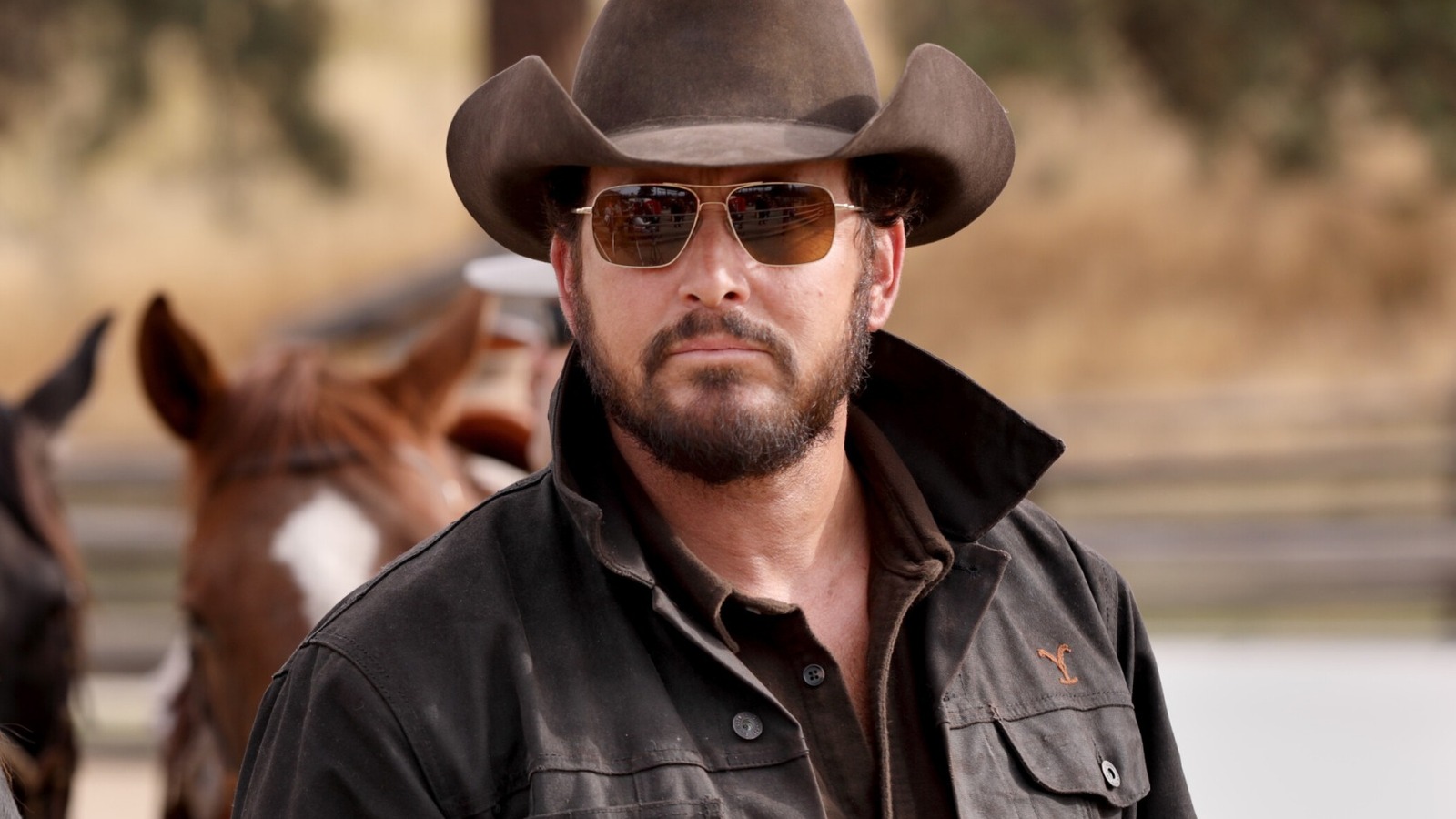Yellowstone, the critically acclaimed TV series, has sparked numerous debates and controversies throughout its run, with one of the most significant being the "rip from Yellowstone" phenomenon. This term refers to the intense reactions and debates surrounding certain plotlines, characters, and real-life parallels in the show. As the series continues to grow in popularity, understanding the implications of these controversies becomes crucial for both fans and casual viewers.
Yellowstone, created by Taylor Sheridan, has captivated audiences worldwide with its gripping storylines and complex characters. However, the show's willingness to tackle sensitive topics and its real-world connections have led to heated discussions and controversies. This article delves into the heart of these debates, exploring their origins, impacts, and the broader implications for the entertainment industry.
By analyzing the "rip from Yellowstone" phenomenon, we aim to provide a comprehensive understanding of the controversies surrounding the series. This exploration will shed light on the show's influence on societal discussions and its role in shaping modern entertainment narratives. Join us as we unravel the complexities behind this cultural phenomenon.
Read also:5 Movies Rulz
Understanding the "Rip From Yellowstone" Phenomenon
What Does "Rip From Yellowstone" Mean?
The phrase "rip from Yellowstone" refers to the show's tendency to incorporate real-life events, political issues, and societal challenges into its storylines. This approach has drawn both praise and criticism from viewers. On one hand, it highlights the show's commitment to addressing important topics. On the other hand, it has sparked debates about the ethical implications of using real-life tragedies for entertainment purposes.
For instance, Yellowstone's portrayal of land disputes, Native American rights, and corporate greed mirrors real-world conflicts. While this adds depth to the narrative, it also raises questions about the show's responsibility to accurately represent these issues.
Why Has It Become Controversial?
The controversy surrounding "rip from Yellowstone" stems from several factors:
- Sensitivity of Topics: The show tackles highly sensitive subjects, such as violence, corruption, and racial tensions. This can lead to discomfort among viewers who feel these issues are not handled responsibly.
- Real-Life Connections: Some viewers believe the show exploits real-life tragedies for dramatic effect, which can be seen as disrespectful to those affected.
- Public Perception: The media and public opinion play a significant role in shaping the narrative around these controversies, often amplifying the debate.
Yellowstone's Impact on Popular Culture
How Yellowstone Has Influenced Modern Storytelling
Yellowstone's bold approach to storytelling has set a new standard in the entertainment industry. By blending drama, action, and social commentary, the show has redefined what audiences expect from modern television. Its willingness to tackle controversial topics has inspired other creators to push boundaries and explore complex narratives.
This influence extends beyond just the storylines. The show's success has demonstrated the potential for niche, character-driven dramas to achieve mainstream success, paving the way for similar projects in the future.
Yellowstone's Role in Shaping Societal Discussions
Through its storylines, Yellowstone has sparked important conversations about land ownership, cultural heritage, and economic inequality. By bringing these issues to the forefront, the show has encouraged viewers to think critically about the world around them. This has led to increased awareness and dialogue on these topics, both online and offline.
Read also:5movierulz Plz 2023
Key Controversies Surrounding Yellowstone
Land Disputes and Native American Representation
One of the most significant controversies surrounding Yellowstone is its portrayal of land disputes involving Native American tribes. Critics argue that the show perpetuates harmful stereotypes and fails to accurately represent the perspectives of indigenous communities. While the series has attempted to address these concerns by consulting with Native American advisors, the debate continues to rage on.
According to a report by the National Congress of American Indians, accurate representation of Native American issues in media remains a critical challenge. Yellowstone's handling of these topics has been both praised and criticized, highlighting the complexities involved in addressing such sensitive subjects.
Violence and Ethical Concerns
Yellowstone's frequent depiction of violence has also drawn scrutiny. While some viewers appreciate the show's gritty realism, others argue that it glorifies violence and desensitizes audiences to its consequences. This has led to discussions about the ethical responsibilities of creators in portraying such content.
A study published in the Journal of Entertainment Computing suggests that excessive violence in media can have negative psychological effects on viewers. As such, the debate over Yellowstone's use of violence remains an important topic for discussion.
Exploring the Show's Characters and Storylines
Kevin Costner's Dutton Family: A Study in Complexity
Central to Yellowstone's narrative is the Dutton family, led by John Dutton (played by Kevin Costner). The family's struggles to protect their land and legacy form the backbone of the series. Each character brings a unique perspective to the story, contributing to the show's rich tapestry of themes and conflicts.
Through their interactions, the Duttons explore issues such as family loyalty, power dynamics, and moral ambiguity. This complexity has made the characters relatable and compelling, despite their flaws and controversial actions.
Subplots and Their Significance
Yellowstone's subplots delve into various aspects of rural life, corporate interests, and political intrigue. These storylines not only enrich the main narrative but also provide insight into the broader socio-economic context of the show. By weaving these elements together, the series creates a multi-layered experience that resonates with viewers on multiple levels.
The Role of Media in Shaping Public Perception
How Media Coverage Affects the "Rip From Yellowstone" Debate
Media coverage plays a crucial role in shaping public perception of Yellowstone and its controversies. News outlets, social media platforms, and fan communities all contribute to the discourse surrounding the show. This can lead to both positive and negative outcomes, depending on the tone and focus of the coverage.
For example, articles highlighting the show's social commentary may encourage viewers to engage with the material on a deeper level. Conversely, sensationalized headlines can fuel misunderstandings and perpetuate stereotypes. Balancing these influences is essential for fostering constructive discussions about the series.
The Broader Implications for the Entertainment Industry
Setting New Standards for Storytelling
Yellowstone's approach to storytelling has set new standards for the entertainment industry. By addressing controversial topics and pushing creative boundaries, the show has demonstrated the potential for television to tackle important issues while maintaining commercial success. This has inspired other creators to explore similar themes in their work, leading to a more diverse and engaging landscape for viewers.
Challenges and Opportunities for Future Projects
As the industry continues to evolve, creators face both challenges and opportunities in addressing controversial topics. The success of Yellowstone highlights the importance of authenticity, research, and collaboration in developing compelling narratives. By learning from the show's experiences, future projects can navigate these complexities more effectively, ensuring that they resonate with audiences while maintaining integrity.
Public Reaction and Audience Engagement
Fan Responses to Controversial Storylines
Audience reactions to Yellowstone's controversial storylines vary widely. Some viewers appreciate the show's willingness to tackle difficult subjects, while others feel alienated by its approach. This diversity of opinion reflects the broader cultural landscape, where differing perspectives on sensitive issues are increasingly visible.
Social media platforms have played a significant role in amplifying these discussions, allowing fans to connect and share their thoughts on the series. This engagement has created a vibrant community around Yellowstone, contributing to its ongoing popularity and relevance.
Building a Dialogue with Viewers
To foster meaningful connections with its audience, Yellowstone's creators have embraced opportunities to engage with fans directly. Through interviews, panel discussions, and behind-the-scenes content, the show has provided insights into its creative process and addressed concerns raised by viewers. This transparency helps build trust and encourages constructive dialogue about the series.
Conclusion: Reflecting on Yellowstone's Legacy
In conclusion, the "rip from Yellowstone" phenomenon highlights the show's impact on popular culture and its role in shaping societal discussions. By addressing controversial topics and pushing creative boundaries, Yellowstone has set a new standard for modern television. While debates surrounding the series will undoubtedly continue, its influence on the entertainment industry cannot be overstated.
We invite you to join the conversation by sharing your thoughts in the comments below. Your feedback helps us understand diverse perspectives and enriches our collective understanding of this cultural phenomenon. For more insights into the world of entertainment, explore our other articles and stay updated on the latest trends shaping the industry.
Table of Contents
- Understanding the "Rip From Yellowstone" Phenomenon
- Yellowstone's Impact on Popular Culture
- Key Controversies Surrounding Yellowstone
- Exploring the Show's Characters and Storylines
- The Role of Media in Shaping Public Perception
- The Broader Implications for the Entertainment Industry
- Public Reaction and Audience Engagement
- Conclusion: Reflecting on Yellowstone's Legacy


